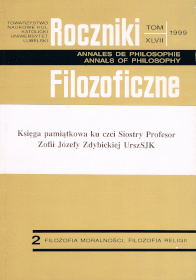Freedom in the Perspective of the Truth. Regarding Philosophical Foundations of Moral Theology
Abstract
A concise answer to the question: „What does it mean to be free?” asked at the beginning of the present paper may be – as result of the discussion – briefly formulated as follows:
Only the freedom of a subject who is obedient to the – recognised by him – objective truth is real freedom.
In other words, the subject confirms himself as a free one, i.e. remains himself, as one who is dependent on himself, always and only, when with the act of his own free choice he confirms the truth recognised by his own cognitive act – although it is independent of him. And in this sense only the truth – recognised by the subject with his own cognitive act and by the same act accepted as such (but at the same time independent of him) – may through the act of being chosen, confirm and fulfil the subject in his integral identity (selfness), or „liberate” him. It is precisely in this sense that Jesus Christ most concisely defined the relation between freedom and the truth in his words: „And you will know the truth, and the truth will set you free” (John 8:32).
Copyright (c) 1999 Roczniki Filozoficzne

This work is licensed under a Creative Commons Attribution-NonCommercial-NoDerivatives 4.0 International License.





